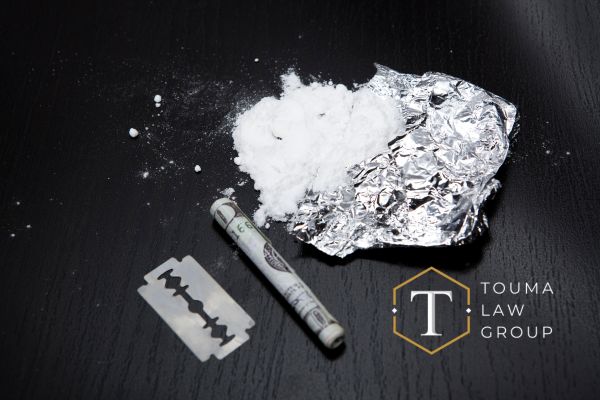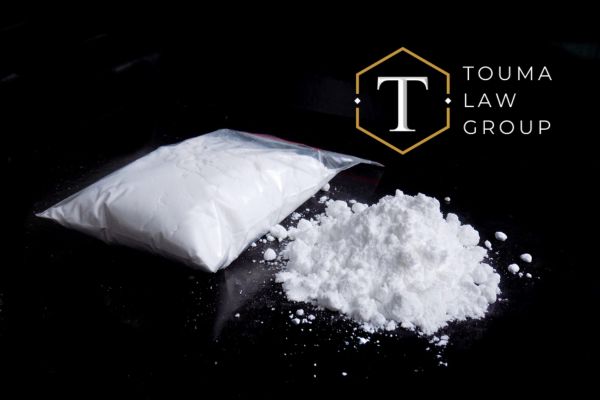Law enforcement on a state and federal level has been stricter towards people involved with the possession or trade of cocaine recently. This is especially true in South Carolina, where there are connections to some international cocaine trafficking networks.
Given the high fines and long jail time associated with drug offenses related to cocaine, it is essential that you take such charges very seriously from the beginning.

To make sure that your rights are fully protected, even if you were just in the wrong place at the wrong time, it’s important to have a defense lawyer in Greenville who knows the legal system, including drug charges related to cocaine cases. You can call our firm or submit a contact form to schedule a free consultation.
The Consequences of Possession of Cocaine in South Carolina
In South Carolina, possessing cocaine is the least serious cocaine-related offense. However, it should be noted that “possession” in this context has a different meaning than what you may think of outside of the legal realm.
Actual possession entails physical control or custody of the cocaine, whether it is in your pants pocket, shirt pocket, or somewhere else on your person.
It’s tricky to understand constructive possession. Even if you haven’t come into physical contact with cocaine, you can still be charged with possession of it if law enforcement has In addition, if the drug is within the trunk of a car that you are driving, no matter whether or not it belongs to you, then charges for its possession can be pressed against you since it is known that cocaine goes against the law and your control over it is evident (like having the key to unlock the trunk or understanding how to do so while totally controlling the vehicle).

Even if you never actually handled the cocaine, legally, you are still considered to have possession of it; for example, if it was contained in a bag. Possession charges may be made against you regardless.
If, for instance, you make plans for someone to deliver cocaine to you (via mail, UPS, or dropping it off at your house, etc.), and you never touch the drug yourself. Even if it’s not in your pockets, you can still be charged with having cocaine. Rather, it should be proven that when the cocaine was being "received" by you, you were aware of its illegality and proceeded to keep the drug in your possession even though you were informed of its unlawfulness. Therefore, it is the State’s burden to prove these facts beyond any reasonable doubt.
Comparing Actual and Constructive Possession
Actual possession refers to when someone physically has drugs on them, such as in their pockets, bag, or knapsack.
When it comes to constructive possession, you can be seen as having "command and control" over cocaine or the property where it was discovered when you have power over it, in places like your wardrobe, the console of your car, or other areas.
When there is joint possession, multiple people can be in actual or assumed ownership of the same illegal drug. As an example, if narcotics are found in a vehicle, asserting that one person has them doesn’t mean the other people in the car won’t have any trouble.
It is possible for multiple individuals to get charged with possessing the same drug, even though this doesn’t happen as often in possession cases. It is more prevalent in distribution cases or even more serious crimes.
What Does the South Carolina Legal System Classify as Distributing or Possession With Intent?
In South Carolina, the sale and distribution of cocaine are punishable by law. The severity of the sentence depends on the number of drugs involved as well as your criminal history if you were previously convicted of drug trafficking before. Here are some potential penalties for intent to distribute cocaine:
- Up to $25,000 in fines and up to 15 years of jail time may be imposed.
- Possessing 10-28 grams of cocaine is punishable with a fine of up to $10,000 and imprisonment of 3-10 years.
- For 28-200 grams, a fine of up to $50,000 and a prison sentence ranging from 7-25 years can be expected.
- Possessing 200 to 400 grams of an illegal substance carries a hefty fine of up to $100,000 and 10 to 25 years in jail.
- Possession of more than 400 grams can result in a fine up to $200,000 and a prison sentence of 15-35 years.
- For a second offense, fines of up to $50,000 and prison sentences of 5-30 years can be handed out.
- If a third offense takes place, the punishment may include a fine of up to $50,000 and 15-30 years in jail.
What Methods Do Police Use to Discern Intent?
In a nutshell, this is exactly what it sounds like. If you provide or distribute the narcotic in any way, your charge could be more serious than simple possession. Likewise, even if you didn’t actually sell the drug, but just had the intention to do so, you can still get charged with PWID. To be convicted of distribution, law enforcement must have seen evidence of an actual sale. To make PWID charges effective, the suspect must be shown to have intended to sell the drugs, and this is often done through undercover police or confidential informants.
This proof generally comes from multiple packed bags of the drug or weighing scales that appear to be used for quantifying it. Additionally, according to the law, mere possession of cocaine or crack over one gram is assumed as intent to distribute – regardless if someone is just storing their personal stash for recreational use on a given weekend. Therefore, if you get caught holding more than a gram at once and consider yourself only a casual user, don’t forget about this regulation when planning on possessing a greater quantity than one gram.
Learn More: Why You Should Get a Lawyer For Drug Charges
If it is a first or second offense, someone can request probation rather than jail. If incarcerated, they are eligible for parole, supervised furlough, community supervision, work release, work credits, education credits, and good conduct credits. However, someone convicted of a third offense or higher is usually unable to apply for these benefits.
If someone who’s 18 years old or older distributes crack to a minor, they will be charged with a felony. If convicted, the sentence can include up to 20 years in prison, a fine of up to $30,000, or both punishments.
Trafficking Cocaine
Trafficking cocaine charges mean you possess 10 grams. This usually leads to being charged with trafficking rather than PWID and its penalties are the following:
- For convictions with 10-28 grams, the punishment could be a jail sentence of 3 to 10 years and a fine of up to $25,000.
- For a second offense conviction, 10-28 grams of the substance can result in a $50,000 fine and 5-30 years imprisonment.
- If convicted of possessing 10-28 grams of the substance for a third time or more, the penalty is 25-30 years of imprisonment and a $50,000 fine.
- Between 28 and 100 grams of a 1st offense would result in a prison sentence ranging from 7 to 25 years and a $50,000 fine if found guilty.
- For 28 to 100 grams, a second offense includes a possible sentence of 7 to 30 years in prison and a $50,000 fine.
- 28-100 grams of a 3rd or higher offense can lead to a conviction of 25-30 years and a $50,000 fine.
- Possessing 100 to 200 grams of the drug in your first or any further offenses can lead to a fine of $50,000 and 25 years in prison.
- Possessing 200-400 grams with a first offense or more carries a sentence of 25 years and a fine of $100,000.
- If convicted, those guilty of a first offense involving 400 grams or more will face a 25-30 year prison sentence and be fined $200,000.

In addition to cocaine trafficking, other offenses can lead to higher charges for a 2nd or 3rd time. Also, due to the convictions of trafficking, jail time is always mandatory with no chance of probation being suspended as part of the sentence.
If 10 grams or more of cocaine are found on you, then you’ll likely be facing drug trafficking charges. Trafficking includes not only the distribution and sale of drugs but also their transportation.
Drug-related crimes are very serious, so anyone convicted of these kinds of offenses will face much harsher punishments. The court may also consider the defendant’s prior convictions, both drug-related and otherwise. Penalties depend on how much cocaine was found when arrested by law enforcement and the type and number of previous convictions.
These penalties include mandatory jail or prison sentences; probation is not an option following a conviction. However, a skilled criminal defense attorney may be able to identify any potential legal defenses applicable to your case.
Criminal Offenses Near Schools and Parks Have Other Charges
In addition to the ramifications of cocaine charges, you may face an additional charge if your drug offense was close to a public school or park.
If you buy or sell cocaine within a 0.5-mile radius of a school or park, or are within the school grounds or state parks, then an additional charge may be applicable.
For law enforcement to make a successful proximity charge, the prosecutor/solicitor must demonstrate that the accused was aware of their close location to a school or park while committing a drug crime. Both awareness and action are necessary for this type of charge.
Remember that a proximity charge is an added penalty, separate from the drug charge, with more severe fines and jail time in addition to the sentence from the drug conviction.
South Carolina has strict penalties for the sale and distribution of drugs near schools and parks. Under SC’s two-strike/three-strikes law, people convicted twice or three times on "most serious" or "serious" offenses can be given a life sentence without parole.
What Benefits Does a Criminal Defense Attorney Offer?
Touma Law Group will look over your case with a free consultation. Our drug defense attorneys in Greenville have extensive experience handling all manner of drug charges. Call (864) 618-2323 to get started building a strong defense.



